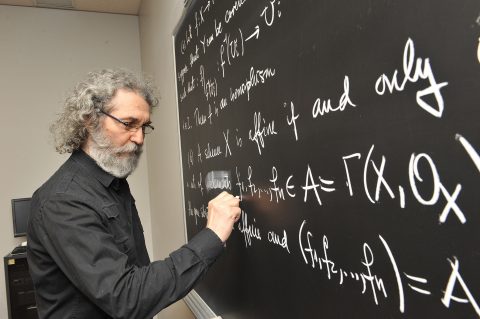Economics (BA)
Why study Economics?
As an economist, you will delve deeply into the world of numbers to provide analysis that will help propel your organization forward, whether you're working for Bombardier or the World Bank. Harnessing the power of statistics and mathematics to tackle economic problems such as interest and tax rates, budget deficits, and sustainable growth, you will be in a position to grapple with challenges that stand to have real-world stakes and impact.
As you acquire the expertise to use the tools of econometrics and economic theory, you may choose to focus on any aspect of economics or acquire a broad background in the discipline. You will also have the option of completing a series of paid internships through the Co-op program, putting you in a position to be job-market ready upon graduation.
Program highlights
- Courses that apply economic theories to life through current global issues
- Unique experiential learning opportunities
Special funding for out-of-province students
Up to $4000 for undergraduate programs.
Program structure
A Bachelor of Arts degree takes a minimum of three or four years (90 – 120 credits) of full-time study, depending on your academic background.
Program options
- Honours in Economics (60 credits)*
- Specialization in Economics (60 credits)
- Major in Economics (42 credits)
- Minor in Economics (30 credits)
- Minor in Analytical Economics (24 credits)
*Honours is a highly concentrated program, ideal for students planning to continue to graduate studies. If you are interested in Honours, speak with your program advisor in your first year of study at Concordia. Students applying to the University are able to apply to the major or specialization.
Courses
The program is built around core economic theory and econometric courses, including advanced courses for honours and specialization students and a wide range of electives that examine issues such as international policies, competition regulations, environmental challenges and financial analyses.
Co-op program
The Co-op program gives academically strong students a chance to complete paid work terms and gain practical experience in their field. Placements range from provincial and federal government departments to companies in insurance, banking and telecommunications. Co-op work terms make it possible for you to do:
- Quantitative and qualitative analyses
- Policy research
- Econometric analyses and interpretation of survey data
Entry to the program requires an interview and a high level of academic performance.
For more information please contact Émilie Martel, Program Coordinator and Student Advisor.
Note: The Co-op program is only available for the Specialization and Honours.
United States students: A U.S. Federal Student Aid-eligible version of this program is offered. This version meets all U.S. regulations (such as no co-operative education or e-courses) for eligible programs.
Admission criteria
Minimum cut-off averages and course requirements
- Quebec CEGEP: 23
- High School: B-
- ACT or SAT is NOT required
- Canadian curricula course requirements
- Accepted international qualifications
- International Baccalaureate (IB) diploma: 27
- International Baccalaureate Career-related Programme (CP): 4.5/7
- Baccalauréat français: 12
- British system of education (GCE):
- A-levels: At least two A-level exams CD or
- AS-levels: At least 4 AS-level exams with equivalent results or
- BTEC: Level 3 Diploma or Extended Diploma in a related subject area with equivalent results
- Additional information for British System of Education (GCE) applicants
- University Transfers (internal/external): B-
Minimum cut-off averages should be used as indicators. The cut-off data may change depending on the applicant pool. Applicants who meet the stated minimum requirements are not guaranteed admission to these programs.
Application deadlines

FALL ENTRY (September)
Deadline: March 1
U.S. and international applicants: Apply no later than February 1 to allow time for immigration document processing. However, applying earlier is strongly recommended. Immigration processing times vary by country and delays could prevent you from starting your studies on time.

WINTER ENTRY (January)
Deadline: November 1
U.S. and international applicants: Apply no later than August 1 to allow time for immigration document processing. However, applying earlier is strongly recommended. Immigration processing times vary by country and delays could prevent you from starting your studies on time.
We reserve the right to close admission to a program at any time after the official deadline without prior notice.
After your degree
According to the Quebec Government’s 2017 Relance inventory, about 37% of Quebec’s BA in Economics graduates move on to graduate programs at leading universities. For students joining the workforce, our program opens up many career paths for you in public and private industries, including:
- Financial analysis
- Banking
- Public sector policy analysis
- Administration
Student stories

Karine Balé
Major in Economics
At Concordia, the vibe is very forward-thinking, and the students are hard workers, almost like revolutionaries.
Other programs of interest

At the John Molson School of Business, our economics major is applied. Because we look at the world though a business lens, you don’t just analyze data to discover how society, politics and the environment interacts with business, you also develop business strategies and organizational tactics to tackle economic problems big and small.
Faculty

Mathematics is a language that answers real-world questions in science and engineering. Statistics is the science of information.
Department
Department of Mathematics & Statistics
Faculty

Political science teaches you how the world works. As one of Concordia’s most popular degree choices, you will meet the world up close: in class, in action and in person.
Department
Department of Political Science
Faculty

